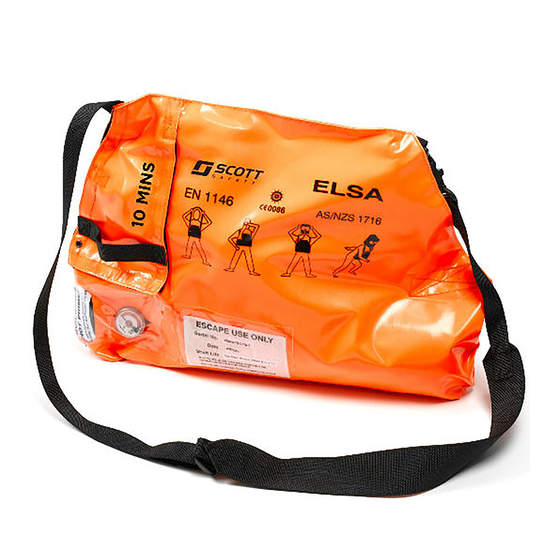
Table of Contents
Advertisement
Advertisement
Table of Contents

Subscribe to Our Youtube Channel
Summary of Contents for 3M Scott Safety ELSA 2000
- Page 1 ELSA 2000 AS/NZS 1716 : 2012 1035070 N Lic. BNP 540244 BSI 08.2019 BENCHMARK...
- Page 3 PRE-OPERATIONAL WARNINGS Please Read Carefully and Fully Understand This manual is for use by personnel trained in the use and care of compressed air escape apparatus, and MUST NOT be used as a self-teaching guide by untrained users. Scott Safety have taken great care to ensure that the information in this manual is accurate, complete and clear.
- Page 4 These products meet the requirements of European Regulation (EU) 2016/425 and applicable local legislation. The applicable European/local legislation and Notified Body can be determined by reviewing the Certificate(s) and Declaration(s) of Conformity at www.3m.com/Respiratory/certs PRODUCT MARKINGS, SYMBOLS AND APPROVALS You must fully read these instructions before using this equipment...
-
Page 5: Storage And Transportation
INTRODUCTION schedule are contained in the Scott Safety ELSA Service Manual, copies of which can BREATHABLE AIR only be obtained by registered holders of Air used to supply or charge breathing a current certificate. air may be natural or synthetic and Your Scott Safety distributor or Training must comply with EN 12021:2014 or AS/ and Technical Support Services will be... -
Page 6: Reducer/Cylinder Valve
Owing to its weight, the 3 litre ELSA is not that holds the inner mask against the suitable for wearing for complete 8 hour wearer’s face. shifts. A sealed foam pad on the inner rear of the Pictogram user instructions and the hood holds the hood in place when the duration of the air supply are prominently wearer’s head moves. - Page 7 CYLINDERS The ELSA 2000 range is approved in various configurations which can utilise diffrent cylinder shells, these shells are available in different materials (steel and composite). The variants using composite cylinder shells may be available in different charging pressures (200 bar and 300 bar) depending on the options or specification available, these are chosen at the time of ordering.
-
Page 8: Scheduled Maintenance
Pull the hood from the bag. Check that there is a steady flow of air into the hood. Breathe normally. LEAVE THE HAZARD AREA IMMEDIATELY. When clear of the hazard area, insert Place the palms of the hands together thumbs under the neck seal and remove and insert through the rubber neck seal. -
Page 9: Routine Checks
wearers must be referred to a properly Check that clean equipped and trained service facility. undamaged. DO NOT perform maintenance tasks unless you have been trained and tasked to do so by a qualified, responsible expert. It is a mandatory requirement that ELSA units are function-tested annually to ensure that the air supply is flowing freely from the cylinder into the hood. - Page 10 Remove Cylinder from Bag: cylinders should take approximately 10 minutes to charge and 15 min. cylinders Break anti-tamper tags, open the bag flap approximately 15 minutes), then close the carefully and release quick-fire strap from compressor supply valve. firing pin. When the cylinder has cooled check that Open the bag fully and check that firing it is full.
-
Page 11: Workshop Repair And Annual Servicing
Fold hood into bag and arrange the (please refer to the ELSA Service breathing hose under the rear of the hood Manual). so that it will not foul when the hood is Apparatus stored in a corrosive, dusty, pulled from the bag. humid environment require... - Page 12 Scott Safety, Pimbo Road, West Pimbo, Skelmersdale, Lancashire, WN8 9RA, UK 3M Wroclaw Sp. z o.o, Kowalska 143, 51-424 Wroclaw, Poland © 3M 2018. All rights reserved. 3M and Scott are English (GB) trademarks of 3M.















Need help?
Do you have a question about the Scott Safety ELSA 2000 and is the answer not in the manual?
Questions and answers